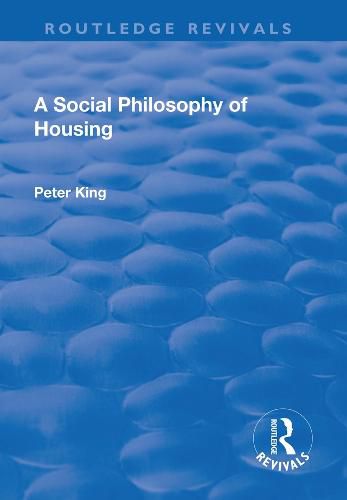Readings Newsletter
Become a Readings Member to make your shopping experience even easier.
Sign in or sign up for free!
You’re not far away from qualifying for FREE standard shipping within Australia
You’ve qualified for FREE standard shipping within Australia
The cart is loading…






This title was first published in 2003. This text seeks to show the importance of housing to individuals and in the broader context of social welfare. It offers a universal philosophical justification for housing provision based on a detailed theoretical consideration of need, choice, rights and responsibility. The implications of basing housing policies on these concepts are considered. Dr Peter King suggests that we should see housing as, above all, a pre-requisite for human flourishing. As such it is an essentially private activity. As a consequence, he argues, housing policy should be limited to a consideration of the enhancement of the personal fulfilment of individuals rather than seeking to further collective or utilitarian ends. Dr King’s purpose in this book is to explore housing using the techniques and methods of social philosophy. He seeks to combat relativist approaches to housing discourse with a theoretical appreciation of housing based on universalist principles derived from Kant and Nozick. The book therefore addresses housing issues with a philosophical rigour, but without ignoring key policy debates.
$9.00 standard shipping within Australia
FREE standard shipping within Australia for orders over $100.00
Express & International shipping calculated at checkout
This title was first published in 2003. This text seeks to show the importance of housing to individuals and in the broader context of social welfare. It offers a universal philosophical justification for housing provision based on a detailed theoretical consideration of need, choice, rights and responsibility. The implications of basing housing policies on these concepts are considered. Dr Peter King suggests that we should see housing as, above all, a pre-requisite for human flourishing. As such it is an essentially private activity. As a consequence, he argues, housing policy should be limited to a consideration of the enhancement of the personal fulfilment of individuals rather than seeking to further collective or utilitarian ends. Dr King’s purpose in this book is to explore housing using the techniques and methods of social philosophy. He seeks to combat relativist approaches to housing discourse with a theoretical appreciation of housing based on universalist principles derived from Kant and Nozick. The book therefore addresses housing issues with a philosophical rigour, but without ignoring key policy debates.